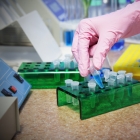Press monitoring
Clone your camel: beauty pageants, races spur high demand
13.9.2021 | Press monitoring
Cloning is in high demand in the competitive world of camel beauty pageants, leaving scientists at a Dubai clinic working round the clock to produce carbon-copy beasts. Not every animal is blessed with sought-after drooping lips and a tall, elegant neck, but technology now allows wealthy clients to replace their most beautiful camel with one just...
Anti-rust coating for plants protects against disease with cellulose nanofiber
10.9.2021 | Press monitoring
A water-absorbent coat to keep rust away? It may seem counterintuitive but when it comes to soybean plants and rust disease, researchers from Japan have discovered that applying a coating that makes leaf surfaces water absorbent helps to protect against infection. Researchers from the University of Tsukuba have revealed that coating soybean plant...
Scientists give lab-grown mini-brains Parkinson\'s disease
8.9.2021 | Press monitoring
Much of the prior research into Parkinson’s has been conducted in mouse models of the disease, but that’s far from a perfect analog of humans. Some of the most characteristic pathological features of Parkinson’s don’t actually appear in mice, leading to an incomplete picture of disease progression or experimental treatments. To help us crack the...
Self-Injecting Pill Could Allow Oral Delivery of Monoclonal Antibody and Other Protein Drugs
6.9.2021 | Press monitoring
MIT engineers, in collaboration with scientists from Brigham and Women’s Hospital and Novo Nordisk, are developing a drug capsule technology that could allow the oral delivery of monoclonal antibodies, or other large protein-based drugs that normally have to be injected, for diseases ranging from cancer, to rheumatoid arthritis, to Crohn’s...
Researchers develop an engineered mini CRISPR genome editing system
3.9.2021 | Press monitoring
The common analogy for CRISPR gene editing is that it works like molecular scissors, cutting out select sections of DNA. Stanley Qi, assistant professor of bioengineering at Stanford University, likes that analogy, but he thinks it's time to reimagine CRISPR as a Swiss Army knife. The many different CRISPR systems in use or being clinically...
Tracking genetically modified animals
1.9.2021 | Press monitoring
McGill University researchers have discovered a new way to track genetically modified animals using the artificial transgenes they leave behind in the environment. The discovery provides a powerful new tool to locate and manage genetically modified animals that have escaped or been released into the wild. Researchers show for the first time that...
How plant stem cells guard against genetic damage
30.8.2021 | Press monitoring
Scientists have shown how plants can protect themselves against genetic damage caused by environmental stresses.? The growing tips of plant roots and shoots have an in-built mechanism that, if it detects damage to the DNA, causes the cell to 'commit suicide' rather than pass on its defective DNA. Plants have, at the very tips of their roots and...
Farmed carnivores may become disease reservoirs posing human health risk
27.8.2021 | Press monitoring
Carnivorous animals lack key genes needed to detect and respond to infection by pathogens, a study has found. Farming large numbers of carnivores, like mink, could allow the formation of undetected 'disease reservoirs', in which a pathogen could spread to many animals and mutate to become a risk to human health. Research led by the University...
Evolutionary time travel reveals enzymes origins, possible future designs
25.8.2021 | Press monitoring
Researchers have used evolutionary "time travel" to learn how an enzyme evolved over time, from one of Earth's most ancient organisms to modern-day humans. Magnus Wolf-Watz, who is at Ume? University in Sweden, looked back some 2 to 3 billion years to primitive organisms known as archaea. A branch of archaea known as the Asgard phylum,...
Scientists distill cows milk into nano-capsules for drug delivery
23.8.2021 | Press monitoring
Exosomes are nano-sized biological capsules that cells produce to protect and courier delicate molecules throughout the body. The capsules are hardy enough to withstand enzymatic breakdown, as well as acidic and temperature fluctuations in the gut and bloodstream, making them a prime candidate for drug delivery. Harvesting them to achieve...































